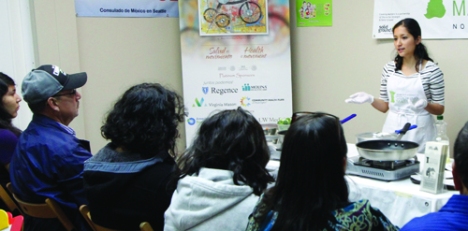All who come to Solid Ground for housing, food and other services face challenges to meeting these basic needs – but there’s an added layer of complexity for our program participants who speak little or no English. To ensure that our services are available to all who need them – regardless of their primary language – we prioritize access to interpretation and translation services.
Language access for racial & social justice
Solid Ground program participants come from myriad cultural backgrounds and language traditions (including American Sign Language). To meet their unique needs, our staff access interpretation and translation services approximately 800 times a year for about 25 different languages.
Our Language Access policies are grounded in our racial and social justice work, as they are absolutely essential to our ability to meet people’s needs in an equitable manner.
Support for our staff
Connecting staff to language services gives them the tools they need to more competently work with limited-English speakers. We strive to leverage both internal and external resources to help staff do their jobs well.

Sandra Williams, Cooking Matters Coordinator & certified Spanish interpreter/ translator, leads a cooking demo at the Seattle Mexican Consulate. (Photo by John Bolivar)
For nearly a decade, a staff Language Access Team – comprised of multilingual staff as well as those who frequently use language services on the job – has worked together to create policies, procedures and a resource guide to inform our work and continuously improve how we deliver services.
The team developed staff training in best practices when working with limited-English speakers, and tips for effectively working with interpreters.
Our Language Access policies support staff in making sure program participants have equitable opportunity to understand the services available to them. They also value the internal capacity of our bilingual employees to interpret and/or translate English into other languages.
Solid Ground also maintains multiple bilingual staff positions to meet significant language needs in different program areas. Bilingual staff are given extra compensation for their skills.
Language access in action
A few common and key ways we utilize language services include:
- Face-to-face and phone meetings between families seeking housing and their case managers and advocates
- Group interpretation for cooking and nutrition classes, advocacy listening sessions, and various workshops (e.g., financial fitness, tenant, homeowner)
- To help domestic violence survivors navigate legal processes and create safety and stability plans
- Phone interpretation for legal representation to help people access public benefits
- Translation of key documents that include technical legal, housing or contractual language or where the consequences of misunderstanding could cause harm
In short, language access is key to Solid Ground’s mission, and we are committed to continually improving our services for limited-English speakers.
Big Picture News is a segment of Solid Ground’s Fall 2015 print newsletter. Sign up here to receive the entire newsletter by snail mail!
Filed under: Groundviews | Tagged: Big Picture News, Groundviews newsletter, interpretation, Language Access, race & social justice, translation | Leave a comment »


